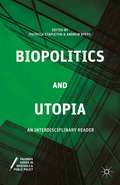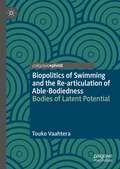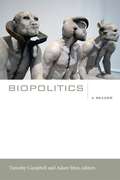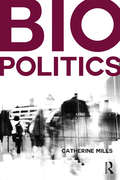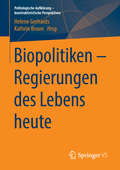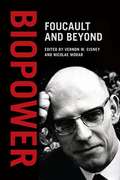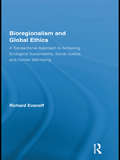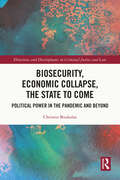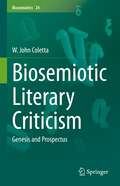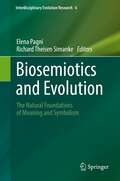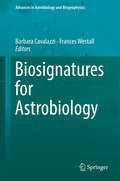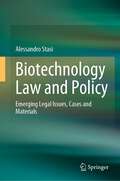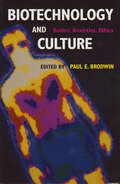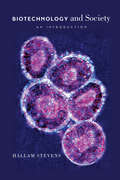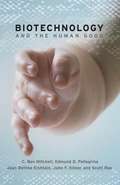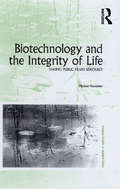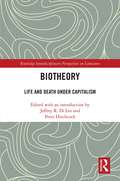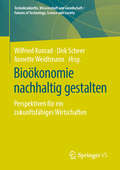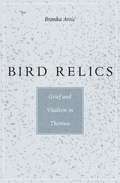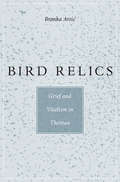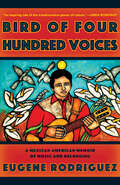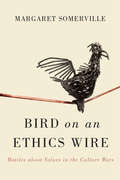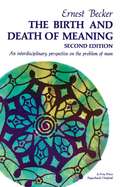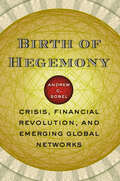- Table View
- List View
Biopolitics and Utopia: An Interdisciplinary Reader (Palgrave Series in Bioethics and Public Policy)
by Patricia Stapleton Andrew ByersThis interdisciplinary reader offers a fascinating exploration of the intersection of biopolitics and utopia by employing a range of theoretical approaches. Each essay provides a unique application of the two concepts to topics spanning the social sciences and humanities.
Biopolitics of Swimming and the Re-articulation of Able-Bodiedness: Bodies of Latent Potential
by Touko VaahteraIn this book, Touko Vaahtera explores how “bodies of latent potential,” a cultural attachment to the idea of body as potentiality, carries with it hierarchizing hopes about better bodies. Vaahtera combines disability studies, cultural studies, feminist science studies, transgender studies, post-colonial studies, and Foucauldian genealogy to offer a provocative approach that interrogates capacities and capabilities as obvious frameworks for thinking about the body. Vaahtera explores how swimming skills emerged as a specific biopolitical question in Finland, a country that has been described as the “Land of a Thousand Lakes.” Through a profound cultural analysis focusing both on Finnish cultural texts on swimming as well as manifold more globalized texts, Vaahtera considers how the legacy of eugenics and colonialism, the hopes of civilization, and homogenizing assumptions about bodies frame how we think about human capacity.
Biopolitics: A Reader
by Adam Sitze Timothy CampbellThis anthology collects the texts that defined the concept of biopolitics that has become so significant throughout the humanities and social sciences today. The far-reaching influence of the biopolitical - the relation of politics to life, or the state to the body - is not surprising given its centrality to matters such as healthcare, abortion, immigration, and the global distribution of essential medicines and medical technologies.
Biopolitics: Bioethics And Biopolitics (International Library Of Ethics, Law, And The New Medicine Ser. #49)
by Catherine MillsThe concept of biopolitics has been one of the most important and widely used in recent years in disciplines across the humanities and social sciences. In Biopolitics, Mills provides a wide-ranging and insightful introduction to the field of biopolitical studies. The first part of the book provides a much-needed philosophical introduction to key theoretical approaches to the concept in contemporary usage. This includes discussions of the work of Michel Foucault, Giorgio Agamben, Hannah Arendt, Roberto Esposito, and Antonio Negri. In the second part of the book, Mills discusses various topics across the categories of politics, life and subjectivity. These include questions of sovereignty and governmentality, violence, rights, technology, reproduction, race, and sexual difference. This book will be an indispensable guide for those wishing to gain an understanding of the central theories and issues in biopolitical studies. For those already working with the concept of biopolitics, it provides challenging and provocative insights and argues for a ground-breaking reorientation of the field.
Biopolitiken – Regierungen des Lebens heute: Regierungen Des Lebens Heute (Politologische Aufklärung – konstruktivistische Perspektiven)
by Helene Gerhards Kathrin BraunDas Buch versammelt konstruktivistische Perspektiven auf das Konzept „Biopolitik“. Dadurch werden die Analysepotentiale für aktuelle Phänomene, die den Zusammenhang zwischen dem Leben und dem Lebendigen und der Regierbarmachung betreffen, ausgelotet. Im Fokus stehen die Strategien und die Objekte der Regierungs- und Regulierungsbemühungen: In welcher Weise werden gesellschaftliche Probleme konstruiert und bestimmten „Zielscheiben“ zugeschrieben? Welche Subjektivierungsformen lassen sich im Rahmen biopolitischer Zugriffe ausmachen? Inwiefern spielen spezifische sozialtheoretische Überlegungen und Konzeptionen von Zeit für biopolitische Strategien und Konflikte eine Rolle? An welchen Gegenständen sind die fortdauernden Konflikte, die sich im Spannungsfeld zwischen Medizin, Ethik und Politik ergeben, zu explizieren?
Biopower
by Vernon W. Cisney Nicolae MorarMichel Foucault's notion of "biopower" has been a highly fertile concept in recent theory, influencing thinkers worldwide across a variety of disciplines and concerns. In The History of Sexuality: An Introduction, Foucault famously employed the term to describe "a power bent on generating forces, making them grow, and ordering them, rather than one dedicated to impeding them, making them submit, or destroying them." With this volume, Vernon W. Cisney and Nicolae Morar bring together leading contemporary scholars to explore the many theoretical possibilities that the concept of biopower has enabled while at the same time pinpointing their most important shared resonances. Situating biopower as a radical alternative to traditional conceptions of power--what Foucault called "sovereign power"--the contributors examine a host of matters centered on life, the body, and the subject as a living citizen. Altogether, they pay testament to the lasting relevance of biopower in some of our most important contemporary debates on issues ranging from health care rights to immigration laws, HIV prevention discourse, genomics medicine, and many other topics.
Bioregionalism and Global Ethics: A Transactional Approach to Achieving Ecological Sustainability, Social Justice, and Human Well-being
by Richard EvanoffWhile a number of schools of environmental thought — including social ecology, ecofeminism, ecological Marxism, ecoanarchism, and bioregionalism — have attempted to link social issues to a concern for the environment, environmental ethics as an academic discipline has tended to focus more narrowly on ethics related either to changes in personal values or behavior, or to the various ways in which nature might be valued. What is lacking is a framework in which individual, social, and environmental concerns can be looked at not in isolation from each other, but rather in terms of their interrelationships. In this book, Evanoff aims to develop just such a philosophical framework — one in which ethical questions related to interactions between self, society, and nature can be discussed across disciplines and from a variety of different perspectives. The central problem his study investigates is the extent to which a dichotomized view of the relationship between nature and culture, perpetuated in ongoing debates over anthropocentric vs. ecocentric approaches to environmental ethics, might be overcome through the adoption of a transactional perspective, which offers a more dynamic and coevolutionary understanding of how humans interact with their natural environments. Unlike anthropocentric approaches to environmental ethics, which often privilege human concerns over ecological preservation, and some ecocentric approaches, which place more emphasis on preserving natural environments than on meeting human needs, a transactional approach attempts to create more symbiotic and less conflictual modes of interaction between human cultures and natural environments, which allow for the flourishing of both.
Biosecurity, Economic Collapse, the State to Come: Political Power in the Pandemic and Beyond
by Christos BoukalasThis book offers an in-depth critical account of the state’s responses to the biosecurity and the economic crises. It is thus the first study to address both crises ensuing from the pandemic, and to synthesise the responses to them in a comprehensive account of political power. What kind of state emerges from the pandemic? The pandemic caused two crises, in biosecurity and in the economy. The state was forced to tackle both; but subduing one inevitably exacerbated the other. Emerging from the impossible task of handling two conflicting crises is a new form of state, the state to come. Addressing biosecurity, the book deciphers its key modalities, epistemic premises, its law, the threat it aims to oppose, and the ways in which it relates to public health and society —especially its extraordinary power to suspend society. Addressing the economic crisis, the book deciphers the actuality and prospects of both the economy and the state’s economic policy. It claims that economic policy is now dual: it adopts countercyclical measures to serve and entrench a neoliberal economy. The responses to the twin crises inform the outline of the emerging state: its structure, logic, and legality; its power and its relation to society. This is a state of extraordinary power; but its only purpose is to preserve the social order intact. It is a despotic state: powerful, and set to impose social stasis. This book offers groundbreaking analysis based on our pandemic experience. It is indispensable for critical scholars and students in Politics, Security Studies, Sociology, Law, Political Economy and Public Health.
Biosemiotic Literary Criticism: Genesis and Prospectus (Biosemiotics #24)
by W. John ColettaThis volume is based to a large extent on the understanding of biosemiotic literary criticism as a semiotic-model-making enterprise. For Jurij Lotman and Thomas A. Sebeok, “nature writing is essentially a model of the relationship between humans and nature” (Timo Maran); biosemiotic literary criticism, itself a form of nature writing and thus itself an ecological-niche-making enterprise, will be considered to be a model of modeling, a model of nature naturing. Modes and models of analysis drawn from Thomas A. Sebeok and Marcel Danesi’s Forms of Meaning: Modeling Systems Theory and Semiotic Analysis as well as from Timo Maran’s work on “modeling the environment in literature,” Edwina Taborsky’s writing on Peircean semiosis, and, of course, Jesper Hoffmeyer’s formative work in biosemiotics are among the most important organizing elements for this volume.
Biosemiotics and Evolution: The Natural Foundations of Meaning and Symbolism (Interdisciplinary Evolution Research #6)
by Elena Pagni Richard Theisen SimankeThis book reviews the evolution of Biosemiotics and gives an outlook on the future of this interdisciplinary new discipline. In this volume, the foundations of symbolism are transformed into a phenomenological, technological, philosophical and psychological discussion enriching the readers’ knowledge of these foundations. It offers the opportunity to rethink the impact that evolution theory and the confirmations about evolution as a historical and natural fact, has had and continues to have today. The book is divided into three parts:Part I Life, Meaning, and InformationPart II Semiosis and EvolutionPart III Physics, medicine, and bioenergetics It starts by laying out a general historical, philosophical, and scientific framework for the collection of studies that will follow. In the following some of the main reference models of evolutionary theories are revisited: Extended Synthesis, Formal Darwinism and Biosemiotics. The authors shed new light on how to rethink the processes underlying the origins and evolution of knowledge, the boundary between teleonomic and teleological paradigms of evolution and their possible integration, the relationship between linguistics and biological sciences, especially with reference to the concept of causality, biological information and the mechanisms of its transmission, the difference between physical and biosemiotic intentionality, as well as an examination of the results offered or deriving from the application in the economics and the engineering of design, of biosemiotic models for the transmission of culture, digitalization and proto-design. This volume is of fundamental scientific and philosophical interest, and seen as a possibility for a dialogue based on theoretical and methodological pluralism. The international nature of the publication, with contributions from all over the world, will allow a further development of academic relations, at the service of the international scientific and humanistic heritage.
Biosignatures for Astrobiology (Advances in Astrobiology and Biogeophysics)
by Barbara Cavalazzi Frances WestallThis book aims at providing a brief but broad overview of biosignatures. The topics addressed range from prebiotic signatures in extraterrestrial materials to the signatures characterising extant life as well as fossilised life, biosignatures related to space, and space flight instrumentation to detect biosignatures either in situ or from orbit. The book ends with philosophical reflections on the implications of life elsewhere. In the 15 chapters written by an interdisciplinary team of experts, it provides both detailed explanations on the nature of biosignatures as well as useful case studies showing how they are used and identified in ancient rocks, for example. One case study addresses the controversial finding of traces of fossil life in a meteorite from Mars. The book will be of interest not only to astrobiologists but also to terrestrial paleontologists as well as any reader interested in the prospects of finding a second example of life on another planet.
Biotechnology Law and Policy: Emerging Legal Issues, Cases and Materials
by Alessandro StasiThis book covers an extensive range of issues raised by biotechnological advancements from a regulatory perspective. Written in a clear and readable style, its main objective is to give readers an idea of the relationship between biotechnology and law. Biotechnology advancements and their ethical, moral, economic, and social implications in different fields and the consequential normative demands on the law are crucial to this book. The chapters cover a multitude of themes and some of the most important legal issues arising in relation to biotechnology, including the historical development of a legal framework sufficient to protect public safety, the current biotechnology regulatory system, and the rules directing the primary agencies that regulate the products of biotechnology, namely the US Food and Drug Administration, the US Department of Agriculture, and the US Environmental Protection Agency, patents and IP rights in biotechnology, the regulation of human genome editing and its impact on health research, law and emerging genome editing technologies from recombinant DNA to CRISPR/Cas9, the development of legal principles to protect property rights in the human body and allow the efficient use of human tissue, organs, DNA, and cell-lines in medical research, and legal issues arising from the use of genetic engineered plants and animals.Presenting arguments that have been drawn from careful examination of various international documents and decisions made by legal institutions and judicial bodies, this book would be a valuable read for practitioners as well as academics of biotechnology law.
Biotechnology and Culture: Bodies, Anxieties, Ethics
by Paul E. BrodwinEssays on technology’s effect on our relationship with our bodies: “A timely and perceptive look . . . at some of the most anxiety producing issues of the day.” —Paul Rabinow, University of California, BerkeleyAs birth, illness, and death increasingly come under technological control, struggles arise over who should control the body and define its limits and capacities. Biotechnologies turn the traditional “facts of life” into matters of expert judgment and partisan debate. They blur the boundary separating people from machines, male from female, and nature from culture. In these diverse ways, they destroy the “gold standard” of the body, formerly taken for granted.Biotechnologies become a convenient, tangible focus for political contests over the nuclear family, legal and professional authority, and relations between the sexes. Medical interventions also transform intimate personal experience: giving birth, building new families, and surviving serious illness now immerse us in a web of machines, expert authority, and electronic images. We use and imagine the body in radically different ways, and from these emerge new collective discourses of morality and personal identity.This book brings together historians, anthropologists, cultural critics, and feminists to examine the broad cultural effects of technologies such as surrogacy, tissue-culture research, and medical imaging. The moral anxieties raised by biotechnologies and their circulation across class and national boundaries provide other interdisciplinary themes for discourse in these essays. The authors favor complex social dramas of the refusal, celebration, or ambivalent acceptance of new medical procedures. Eschewing polemics or pure theory, contributors show how biotechnology collides with everyday life and reshapes the political and personal meanings of the body.Contributors include Paul Brodwin, Lisa Cartwright, Thomas Csordas, Gillian Goslinga-Roy, Deborah Grayson, Donald Joralemon, Hannah Landecker, Thomas Laqueur, Robert Nelson, Susan Squier, Janelle Taylor, and Alice Wexler.“This impressive collection offers a number of rich examples of why the development of anthropological studies of science, technology, and their disruptive social effects is a leading edge of critical enquiry.” —Arthur Kleinman, Harvard University
Biotechnology and Society: An Introduction
by Hallam StevensWith Biotechnology and Society, Hallam Stevens offers an up-to-date primer to help us understand the interactions of biotechnology and society and the debates, controversies, fears, and hopes that have shaped how we think about bodies, organisms, and life in the twenty-first century. Stevens addresses such topics as genetically modified foods, cloning, and stem cells; genetic testing and the potential for discrimination; fears of (and, in some cases, hopes for) designer babies; personal genomics; biosecurity; and biotech art. Taken as a whole, the book presents a clear, authoritative picture of the relationship between biotechnology and society today, and how our conceptions (and misconceptions) of it could shape future developments. It is an essential volume for students and scholars working with biotechnology, while still being accessible to the general reader interested in the truth behind breathless media accounts about biotech’s promise and perils.
Biotechnology and the Human Good
by Jean Bethke Elshtain Scott B. Rae C. Ben Mitchell Edmund D. Pellegrino John F. KilnerSome of humankind's greatest tools have been forged in the research laboratory. Who could argue that medical advances like antibiotics, blood transfusions, and pacemakers have not improved the quality of people's lives? But with each new technological breakthrough there comes an array of consequences, at once predicted and unpredictable, beneficial and hazardous. Outcry over recent developments in the reproductive and genetic sciences has revealed deep fissures in society's perception of biotechnical progress. Many are concerned that reckless technological development, driven by consumerist impulses and greedy entrepreneurialism, has the potential to radically shift the human condition -- and not for the greater good. Biotechnology and the Human Good builds a case for a stewardship deeply rooted in Judeo-Christian theism to responsibly interpret and assess new technologies in a way that answers this concern. The authors jointly recognize humans not as autonomous beings but as ones accountable to each other, to the world they live in, and to God. They argue that to question and critique how fields like cybernetics, nanotechnology, and genetics might affect our future is not anti-science, anti-industry, or anti-progress, but rather a way to promote human flourishing, common sense, and good stewardship. A synthetic work drawing on the thought of a physician, ethicists, and a theologian, Biotechnology and the Human Good reminds us that although technology is a powerful and often awe-inspiring tool, it is what lies in the heart and soul of who wields this tool that truly makes the difference in our world.
Biotechnology and the Integrity of Life: Taking Public Fears Seriously
by Michael HauskellerThere are things that can be done and are done to life on earth (whether it be human, animal or plant life) which, even if they do not involve or produce any suffering, are still considered morally wrong by a large proportion of the public. Such things include changing the nature of living beings by means of genetic engineering in order to enhance their health, or, more likely with animals and plants, their utility, or impairing their ability to live autonomously, or unduly instrumentalizing them. Yet many scientists are puzzled about the unwillingness of the public to feel much enthusiasm about a technology that, in their view, promises great benefits to humans and does not seem to cause more harm to animals than other practices which most of us do not question at all. In this book Michael Hauskeller takes public fears seriously and offers the idea of 'biological integrity' as a clarifying principle which can then be analyzed to show that seemingly irrational public concerns about genetic engineering are not so irrational after all and that a philosophically sound justification of those concerns can indeed be given.
Biotheory: Life and Death under Capitalism (Routledge Interdisciplinary Perspectives on Literature)
by Peter Hitchcock Jeffrey R. Di LeoForged at the intersection of intense interest in the pertinence and uses of biopolitics and biopower, this volume analyzes theoretical and practical paradigms for understanding and challenging the socioeconomic determinations of life and death in contemporary capitalism. Its contributors offer a series of trenchant interdisciplinary critiques, each one taking on both the specific dimensions of biopolitics and the deeper genealogies of cultural logic and structure that crucially inform its impress. New ways to think about biopolitics as an explanatory model are offered, and the subject of bios (life, ways of life) itself is taken into innovative theoretical possibilities. On the one hand, biopolitics is addressed in terms of its contributions to forms and divisions of knowledge; on the other, its capacity for reformulation is assessed before the most pressing concerns of contemporary living. It is a must read for anyone concerned with the study of bios in its theoretical profusions.
Bioökonomie nachhaltig gestalten: Perspektiven für ein zukunftsfähiges Wirtschaften (Technikzukünfte, Wissenschaft und Gesellschaft / Futures of Technology, Science and Society)
by Dirk Scheer Wilfried Konrad Annette WeidtmannIn diesem Sammelband werden die Herausforderungen und Potenziale einer zukünftig nachhaltig zu gestaltenden Bioökonomie interdisziplinär beleuchtet. Hierbei wird die Bioökonomie als sozio-technisches System aufgefasst, in dem die technische Ausgestaltung aufs Engste mit sozialen, ökonomischen und politischen Elementen verknüpft ist. Aus unterschiedlichen Perspektiven wird die Transformation des herkömmlichen Wirtschaftens in Richtung einer bioökonomischen Wirtschaftsweise thematisiert. Aspekte von Umbau bzw. Transformation und Zukunftsgestaltung stehen dabei im Mittelpunkt.
Bird Relics: Grief and Vitalism in Thoreau
by Branka ArsicBird Relics traces Thoreau’s evolving thoughts through his investigation of Greek philosophy and the influence of a group of Harvard vitalists who resisted the ideas of the naturalist Louis Agassiz. It takes into account materials often overlooked by critics: his Indian Notebooks and unpublished bird notebooks; his calendars that rewrite how we tell time; his charts of falling leaves, through which he develops a complex theory of decay; and his obsession with vegetal pathology, which inspires a novel understanding of the relationship between disease and health.
Bird Relics: Grief and Vitalism in Thoreau
by Branka ArsićBranka Arsic shows that Thoreau developed a theory of vitalism in response to his brother's death. Through grieving, he came to see life as a generative force into which everything dissolves and reemerges. This reinterpretation, based on sources overlooked by critics, explains many of Thoreau's more idiosyncratic habits and obsessions.
Bird of Four Hundred Voices: A Mexican American Memoir of Music and Belonging
by Eugene RodriguezFrom the founder of Los Cenzontles Cultural Arts Academy, a profoundly personal exploration of music's power to build cultural bridges that last."I wish I had studied with Eugene Rodrigeuz when I was growing up. Read this beautifully written book about culture, identity and resilience, and you will know why." —Linda RonstadtNPR Books We Love 2024: "[Rodriguez's] commitment to his community and his exploration of growing up bicultural are both inspiring."From an early age Eugene Rodriguez knew he was captivated by music. But he found himself encountering the same two problems again and again: the chilly rigidity of so much formal music education, and the underrepresentation of Mexican culture in American media. In 1989 he founded Los Cenzontles (The Mockingbirds), a group that offered music education to Bay Area youth, and that gave pride of place to Mexican musical traditions.Bird of Four Hundred Voices follows Rodriguez as he leads his young students from a California barrio to uncover their ancestral roots. From their home community in San Pablo, Los Cenzontles journey to fandangos in Veracruz, resurrect a lost mariachi tradition, and collaborate with luminaries like Linda Ronstadt, Lalo Guerrero, Taj Mahal, Jackson Browne, Flaco Jiménez, and Los Lobos. Rodriguez's story offers an honest, deeply personal look at the cultural work that confronts historical oppression and joyously challenges cultural borders. And it is a profound celebration of the powerful influence of Mexico's musical heritage on American culture.
Bird on an Ethics Wire: Battles about Values in the Culture Wars
by Margaret SomervilleOur physical ecosystem is not indestructible and we have obligations to hold it in trust for future generations. The same is true of our metaphysical ecosystem - the values, principles, attitudes, beliefs, and shared stories on which we have founded our society. In Bird on an Ethics Wire, Margaret Somerville explores the values needed to maintain a world that reasonable people would want to live in and pass on to their descendants. Somerville addresses the conflicts between people who espouse "progressive" values and those who uphold "traditional" ones by casting her attention on the debates surrounding "birth" (abortion and reproductive technologies) and "death" (euthanasia) and shows how words are often used as weapons. She proposes that we should seek to experience amazement, wonder, and awe to enrich our lives and help us to find meaning. Such experiences, Somerville believes, can change how we see the world and live our lives, and affect the decisions we make, especially regarding values and ethics. They can help us to cope with physical or existential suffering, and ultimately put us in touch with the sacred - in either its secular or religious form - which protects what we must not destroy. Experiencing amazement, wonder, and awe, Somerville concludes, can also generate hope, without which our spirit dies. Both individuals and societies need hope, a sense of connection to the future, if the world is to make the best decisions about values in the battles that constitute the current culture wars.
Bird on an Ethics Wire: Battles about Values in the Culture Wars
by Margaret SomervilleOur physical ecosystem is not indestructible and we have obligations to hold it in trust for future generations. The same is true of our metaphysical ecosystem - the values, principles, attitudes, beliefs, and shared stories on which we have founded our society. In Bird on an Ethics Wire, Margaret Somerville explores the values needed to maintain a world that reasonable people would want to live in and pass on to their descendants. Somerville addresses the conflicts between people who espouse "progressive" values and those who uphold "traditional" ones by casting her attention on the debates surrounding "birth" (abortion and reproductive technologies) and "death" (euthanasia) and shows how words are often used as weapons. She proposes that we should seek to experience amazement, wonder, and awe to enrich our lives and help us to find meaning. Such experiences, Somerville believes, can change how we see the world and live our lives, and affect the decisions we make, especially regarding values and ethics. They can help us to cope with physical or existential suffering, and ultimately put us in touch with the sacred - in either its secular or religious form - which protects what we must not destroy. Experiencing amazement, wonder, and awe, Somerville concludes, can also generate hope, without which our spirit dies. Both individuals and societies need hope, a sense of connection to the future, if the world is to make the best decisions about values in the battles that constitute the current culture wars.
Birth and Death of Meaning (Pelican Ser.)
by Ernest BeckerUses the disciplines of psychology, anthropology, sociology and psychiatry to explain what makes people act the way they do.
Birth of Hegemony: Crisis, Financial Revolution, and Emerging Global Networks
by Andrew C. SobelWith American leadership facing increased competition from China and India, the question of how hegemons emerge-and are able to create conditions for lasting stability-is of utmost importance in international relations. The generally accepted wisdom is that liberal superpowers, with economies based on capitalist principles, are best able to develop systems conducive to the health of the global economy. In Birth of Hegemony, Andrew C. Sobel draws attention to the critical role played by finance in the emergence of these liberal hegemons. He argues that a hegemon must have both the capacity and the willingness to bear a disproportionate share of the cost of providing key collective goods that are the basis of international cooperation and exchange. Through this, the hegemon helps maintain stability and limits the risk to productive international interactions. However, prudent planning can account for only part of a hegemon's ability to provide public goods, while some of the necessary conditions must be developed simply through the processes of economic growth and political development. Sobel supports these claims by examining the economic trajectories that led to the successive leadership of the Netherlands, Britain, and the United States. Stability in international affairs has long been a topic of great interest to our understanding of global politics, and Sobel's nuanced and theoretically sophisticated account sets the stage for a consideration of recent developments affecting the United States.
